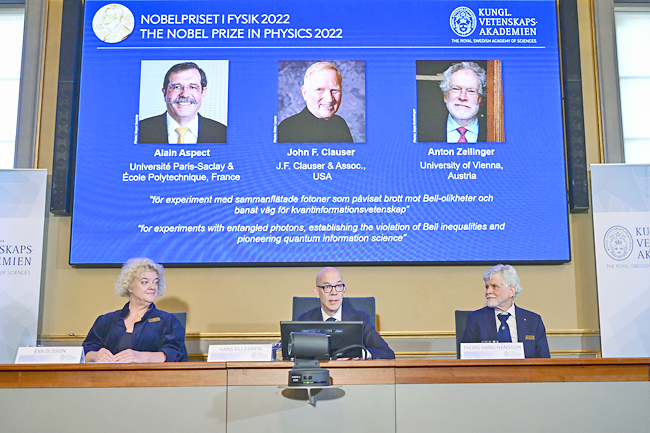STOCKHOLM (AFP) – A trio of physicists yesterday won the Nobel Prize for discoveries in the field of quantum mechanics that have paved the way for quantum computers, networks and secure encrypted communication.
Alain Aspect of France, John Clauser of the United States and Austria’s Anton Zeilinger were honoured “for experiments with entangled photons, establishing the violation of Bell inequalities and pioneering quantum information science”, the Physics Prize jury said in a statement.
Each scientist “conducted groundbreaking experiments using entangled quantum states, where two particles behave like a single unit even when they are separated”, the committee said, adding that the “results have cleared the way for new technology based upon quantum information”.
“It has become increasingly clear that a new kind of quantum technology is emerging,” chair of the Nobel Committee for Physics Anders Irback said in a statement.
Albert Einstein and two other physicists first brought up the idea of quantum entanglement in 1935, in a thought experiment that became known as the EPR paradox.
It involved two or more particles that existed in an “entangled” state, which means that what happens to one determines what happens to the other – even if they are far apart, something Einstein dismissed as “spooky action at a distance”.

Clauser, a research physicist based in California, and Aspect, professor at the Universite Paris-Saclay, were singled out for their developments on the work of John Stewart Bell, who in the 1960s “developed the mathematical inequality that is named after him”.
First, Clauser “built an apparatus that emitted two entangled photons at a time”, through a filter to test their polarisation.
“The result was a clear violation of a Bell inequality and agreed with the predictions of quantum mechanics,” the jury said.
Aspect then closed one loophole that meant the measurement setting did not affect the results after the entangled pair had left its source.
“As an experimenter, I jumped” at the opportunity, Aspect told AFP in 2010.
Zeilinger, a professor of physics at the University of Vienna, said he had not expected to be honoured.
“I was actually very surprised to get the call,” Zeilinger told a Stockholm press conference via telephone.
Zeilinger was highlighted for his work on “quantum teleportation, which makes it possible to move a quantum state from one particle to one at a distance,” the jury said.
“It is not like in the Star Trek films or whatever. Transporting something – certainly not the person – over some distance. But the point is, using entanglement you can transfer all the information which is carried by an object over to some other place where the object is reconstituted,” Zeilinger said.
The physicists have been credited with paving the way towards what has been called the “second quantum revolution”, which opened the door to a new generation of technologies including quantum computing, information processing and even new forms of online passwords.





